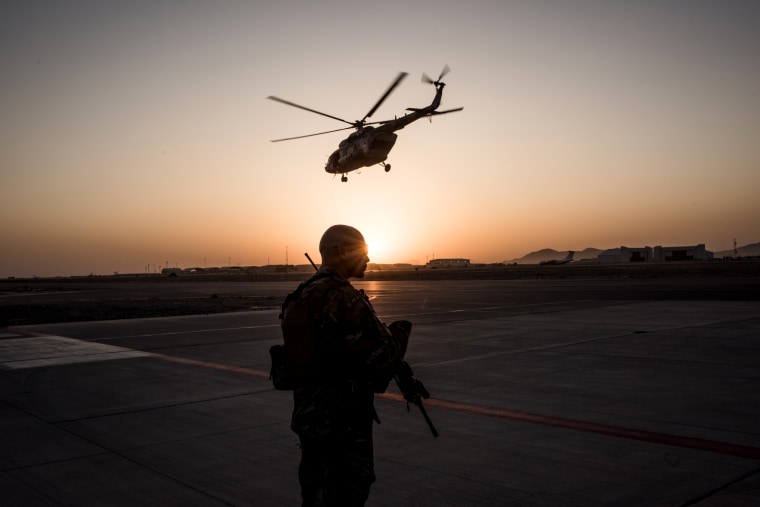WASHINGTON — Nine former senior U.S. diplomats on Tuesday warned that Afghanistan could slide into an all-out civil war and once again become a sanctuary for terrorists if the Trump administration withdrew all U.S. forces without a peace agreement between the Taliban and the Afghan government.
The former ambassadors and envoys, who served in both Democratic and Republican administrations dating back to 2001, wrote in a commentary on the Atlantic Council think tank website that the administration needed to avoid a hasty exit to ensure the Islamic State and other extremists are not given more space to operate and to avoid undermining the Afghan people’s chance to live under a democratic government.
"A major troop withdrawal must be contingent on a final peace," the former diplomats wrote. "The initial U.S. drawdown should not go so far or so fast that the Taliban believe that they can achieve military victory."
The State Department declined to comment.
The post on the Atlantic Council site came after U.S. presidential envoy Zalmay Khalilzad said the United States and the Taliban had clinched an agreement "in principle" pending approval from President Donald Trump. The deal would see an initial withdrawal of 5,000 American troops within 135 days, he told TOLOnews in Kabul.
On Tuesday, a Taliban source told NBC News that "several major attacks" against U.S. and Afghan targets in Afghanistan will be called off after the peace accord with the U.S. is signed.
Khalilzad did not say when the remainder of U.S. troops would withdraw and under what conditions. Trump administration officials have said that any U.S. pull-out would be based on conditions and not a target date for departure.
Under the proposed deal, the Taliban in turn would pledge to ensure Afghanistan is not used as a staging ground for terrorist attacks by al Qaeda or other extremists, and would commit to enter into peace talks with a group of Afghans including members of the Kabul government, according to Trump administration officials, foreign diplomats and Taliban representatives.
In their commentary, the former diplomats said that "there is an outcome far worse than the status quo, namely a return to the total civil war that consumed Afghanistan as badly as the war with the Russians and something that could follow a breakdown in negotiations if we remove too much support from the Afghan state."
In the event of a full-blown civil war, without U.S. forces in place, ISIS "could expand its already strong foothold," outside powers — including Russia, Iran and Pakistan — would back proxies in the conflict and the Taliban would likely maintain their ties with al Qaeda, the authors wrote.
"All of this could prove catastrophic for U.S. national security as it relates to our fight against both al Qaeda and [ISIS], and it would underscore to potential enemies that the United States and its allies are not reliable," according to the article.
It was not a given that peace was even possible in Afghanistan, the former diplomats wrote, saying the Taliban had no track record of working with other political organizations and has never articulated conditions for a political settlement.
A Taliban source told NBC News Tuesday that the Taliban did not plan to announce a ceasefire with the Afghan government "nor participate in any type of power sharing with the puppet Afghan government."
The former diplomats, who include five ex-ambassadors to Kabul, also weighed in on whether Afghanistan should go ahead with elections scheduled for Sept. 28.
If the U.S.-Taliban agreement is signed, peace talks between the Taliban and Afghan representatives would begin promptly this month. And that plan has prompted a debate about whether the country’s elections should be called off. Afghan President Ashraf Ghani has vowed to press ahead with the polls, but some Afghans have argued for an interim government instead, possibly with a role for the Taliban.
But the former diplomats said the Afghan state will need a functioning government while peace talks take place, and a chance to defend itself if the negotiations break down.
"Millions of Afghans have risked, and again are prepared to risk, death to vote," they wrote. "It is not up to the United States to deprive them of this opportunity to determine who speaks for the Afghan state."
U.S. troops have been in Afghanistan since an American-led force toppled the Taliban regime in 2001 for sheltering al Qaeda militants who staged the Sept. 11 attacks on New York and Washington. About 14,000 U.S. troops are currently deployed.
